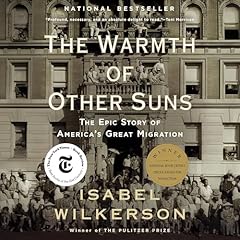
The Color of Law
A Forgotten History of How Our Government Segregated America
No se pudo agregar al carrito
Add to Cart failed.
Error al Agregar a Lista de Deseos.
Error al eliminar de la lista de deseos.
Error al añadir a tu biblioteca
Error al seguir el podcast
Error al dejar de seguir el podcast
Prueba gratis de 30 días de Audible Standard
Compra ahora por $20.56
-
Narrado por:
-
Adam Grupper
In this groundbreaking history of the modern American metropolis, Richard Rothstein, a leading authority on housing policy, explodes the myth that America's cities came to be racially divided through de facto segregation - that is, through individual prejudices, income differences, or the actions of private institutions like banks and real estate agencies. Rather, The Color of Law incontrovertibly makes clear that it was de jure segregation - the laws and policy decisions passed by local, state, and federal governments - that actually promoted the discriminatory patterns that continue to this day.
Through extraordinary revelations and extensive research that Ta-Nehisi Coates has lauded as "brilliant" (The Atlantic), Rothstein comes to chronicle nothing less than an untold story that begins in the 1920s, showing how this process of de jure segregation began with explicit racial zoning, as millions of African Americans moved in a great historical migration from the south to the north.
As Jane Jacobs established in her classic The Death and Life of Great American Cities, it was the deeply flawed urban planning of the 1950s that created many of the impoverished neighborhoods we know. Now, Rothstein expands our understanding of this history, showing how government policies led to the creation of officially segregated public housing and the demolition of previously integrated neighborhoods. While urban areas rapidly deteriorated, the great American suburbanization of the post-World War II years was spurred on by federal subsidies for builders on the condition that no homes be sold to African Americans. Finally, Rothstein shows how police and prosecutors brutally upheld these standards by supporting violent resistance to Black families in White neighborhoods.
The Fair Housing Act of 1968 prohibited future discrimination but did nothing to reverse residential patterns that had become deeply embedded. Yet recent outbursts of violence in cities like Baltimore, Ferguson, and Minneapolis show us precisely how the legacy of these earlier eras contributes to persistent racial unrest. Rothstein's invaluable examination shows that only by relearning this history can we finally pave the way for the nation to remedy its unconstitutional past.
©2017 Richard Rothstein (P)2017 Recorded BooksLos oyentes también disfrutaron:




















Reseñas de la Crítica
"With confidence and clarity, narrator Adam Grupper describes discriminatory laws governing the actions of the Federal Housing Administration, Department of Education, Department of Veterans Affairs, and other government agencies that have shaped African-Americans' ability to gain wealth, health, education, and voting power, not merely in the past but in the present day.... The Color of Law is compelling and convincing - and maybe even essential." (AudioFile)
Las personas que vieron esto también vieron:


















Disparities Explained
Se ha producido un error. Vuelve a intentarlo dentro de unos minutos.
True History
Se ha producido un error. Vuelve a intentarlo dentro de unos minutos.
The mean spirited history in the most high places of government. Also, it makes things easier to understand how African Americans got in the conditions they face today. It’s so sad
To hear the awful stories that ruined so many people’s lives. Great Book!
Powerful
Se ha producido un error. Vuelve a intentarlo dentro de unos minutos.
Made aware
Se ha producido un error. Vuelve a intentarlo dentro de unos minutos.
Hard to read without getting angry
Se ha producido un error. Vuelve a intentarlo dentro de unos minutos.


